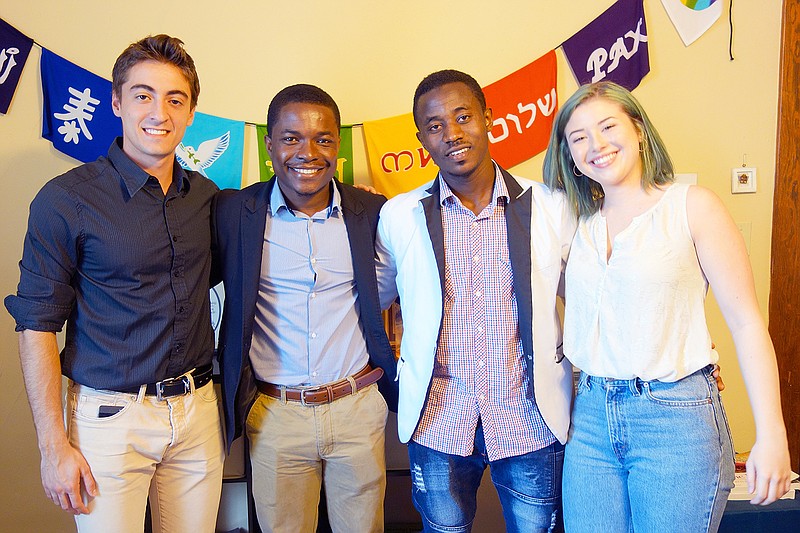Westminster College student Jephte Ngendo is heading back to Uganda to start his second preschool.
"The idea is to give back," Ngendo said. "After getting the skills, you're expected to bring them back to your community."
He'll be accompanied by fellow students Joseph Opoku, Madi Loescher and Nicolas Lopez. Ngendo plans on heading to the small village in the Kiboga district this weekend to purchase land and materials and begin the construction process.
"It makes sense for him to be doing that as someone who's connected - the prices would be doubled for some foreigner," Opoku added with a grin.
The rest of the team will follow later to spend three weeks recruiting teachers and rallying parents to enroll their students.
Where it all began
Ngendo's family fled conflict in the Democratic Republic of the Congo when he was 6 years old, winding up in the Kyangwali
Refugee Settlement. His family still lives there today, though they've registered for a resettlement program.
Due to language barriers - Ngendo's first language was French, while Uganda's official language is English - he didn't get started in school until he was 7. By then, his classmates had completed three years of preschool.
"I couldn't catch up with the curriculum," he said. "I was supposed to be adding, subtracting, multiplying - but I had not been introduced to numbers before. I was supposed to be reading words, but I hadn't learned letters."
It took two years for Ngendo to finish his first year of primary school.
"As I came to grow up I began to get more interested in how I can make sure other children don't have to pass through the same experience," Ngendo said.
He founded his first preschool at Kyangwali shortly after graduating from high school. He drew on connections and knowledge from his time in Coburwas, an organization that educates refugees about entrepreneurship and leadership, and his internship with the Community Action Project.
During that internship, he began doing research on the education system within and outside refugee camps, and saw there was need for more preschools in many areas. A friend of his from the Community Action Project grew up in the Kiboga district and suggested the village the team is targeting.
Opoku said he can relate to Ngendo's experience. He's from Ghana and started school at age 9.
"A lot of preschools (in Ghana) are private schools, so you cannot afford it," he said. "You're starting at a position of disadvantage already."
He and Lopez were planing on pursuing a grant through Projects for Peace, an initiative that provides funding for projects that contribute to "sustainable peace." After hearing about Opoku's plans to build a preschool, however, they decided to join forces with him. Loescher shared classes with Ngendo and found his enthusiasm infectious.
Grant accepted
The four successfully applied for a grant that should allow the team to travel to Uganda and build the preschool.
"To prep for the grant interview, we basically put each other on trial and fired questions at each other," Loescher said.
However, they're continuing to do fundraising. High airline prices cut into funding, and the more money the team can raise, the more resources they'll be able to provide to ensure the school is a success. For example, the team hopes to build a pit latrine, buy desks, acquire children's books, purchase some uniforms and set up a fund to pay teacher wages until the school is self-sustaining.
"To make sure everyone in the community has a chance, we're basing tuition on what they can give," Ngendo said.
Families with more income may pay a tuition fee equal to about $60 per school year. Those who can't afford that can donate portions of their crops or work a few hours each week in the school's garden, with the food going to feed the students.
Keeping in touch
Once the school is established, Ngendo plans on revisiting it at least annually. Coburwas will also help provide oversight.
The team thinks their mission is especially important because while there are many scholarships for high school and college students, there are few resources to help children make it to secondary education. A solid educational foundation in preschool will help students achieve success throughout their academic career, they hope.
"When you change the legacy of one child, you change the legacy for the whole family and the family that kid may someday start," Loescher sad.
To donate, contact WC Chaplain Resident Kiva Nice-Webb at 573-592-6213.

